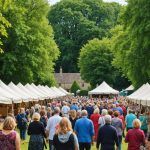Provence offers a captivating blend of rich cultural heritage and vibrant local traditions that shape its unique identity. Discover how time-honoured festivals, historic landmarks, and the melodious Provençal language all come together to create a living portrait of French tradition. This region’s distinctive cuisine, stunning landscapes, and artistic legacy provide travellers with an immersive experience that connects past and present in unforgettable ways.
Embracing Provençal Traditions and Heritage
Delving into Provence culture reveals a rich tapestry of French traditions deeply rooted in the region’s unique identity. These time-honoured customs form the bedrock of Provence’s cultural landscape, passed down through generations with great pride. One striking example is the celebration of regional festivals, which play a crucial role in preserving Provençal heritage by bringing communities together to honour ancient rituals and local folklore.
In parallel : Furnished apartments for remote workers: your ideal workspace solution
Provençal festivals, such as the Fête de la Saint-Jean, illuminate the region’s vibrant customs, where fire and music combine to create a lively celebration of midsummer traditions. These festivals serve not only as entertainment but also as living history, reinforcing a collective sense of belonging and cultural continuity. The deep connection between the people and their traditions is often visibly expressed through traditional costumes, dances, and the use of the Provençal language, all of which enrich the experience and understanding of Provence culture.
Additionally, the landscape of Provence itself is dotted with historical landmarks that reflect the province’s rich past. From the Roman aqueduct of Pont du Gard to the medieval ramparts of Avignon, these sites serve as tangible reminders of the region’s layered history and enduring cultural significance. Exploring these landmarks offers a profound insight into how past civilizations and their values continue to influence modern life in Provence.
Also read : Exploring glastonbury: must-see sites for unraveling ancient mysteries and legendary tales
To truly grasp the essence of Provence culture, immersing oneself in these customs and exploring the region’s heritage provides a window into the soul of southern France. For travelers interested in deepening their connection with French traditions, programs that allow you to learn French in Provence can be particularly enriching, offering direct engagement with both language and local customs.
Experiencing the Local Language of Provence
Discovering the Provençal language offers a unique window into the rich cultural tapestry of southern France. Provençal is one of the many French dialects spoken in this region, distinct yet closely related to standard French. Rooted in the Occitan language family, Provençal carries centuries of history, blending influences from Latin and local traditions. Understanding its characteristics enhances your appreciation of Provence’s identity.
When speaking French in Provence, it’s helpful to recognize the regional nuances in pronunciation and vocabulary. Locals often use expressions unique to the area, which differ noticeably from Parisian French. For travellers, learning a few key phrases in Provençal can open doors to warm exchanges and deeper connections. For example, greeting someone with “Adieu” instead of the standard “Au revoir” reflects local customs and friendliness.
Using everyday phrases respectfully shows cultural awareness and creates a comforting experience. Politeness in language, such as addressing elders with “Monsieur” or “Madame,” and using polite forms like “s’il vous plaît” and “merci,” goes a long way in fostering goodwill. Language serves not only as a tool for communication but as a bridge to the local community’s heart, inviting visitors to share in the Provençal way of life.
To fully immerse yourself, consider exploring opportunities to learn Provençal alongside standard French. This can enrich your stay and deepen your understanding of this beautiful region’s nuances. Discover how to learn French in Provence through specialized programs that focus on both language and culture, giving you a genuinely immersive experience.
Savoring Provençal Cuisine and Wine
Discovering Provence food means indulging in a rich tapestry of flavors shaped by Mediterranean influences and local traditions. Signature dishes like ratatouille, bouillabaisse, and tapenade showcase the region’s bounty of fresh vegetables, fragrant herbs, and seafood. Lamb, olives, garlic, and tomatoes are staples in many recipes, offering a true taste of the local cuisine. Each meal reflects the artisanal approach to cooking that defines Provence food: simple ingredients elevated by skill and passion.
Renowned Provençal wine adds depth to any dining experience. The region’s vineyards produce varieties such as rosé from Côtes de Provence, known for its crisp, fruity character. Visiting these vineyards not only provides insight into winemaking but also allows a sensory journey through the terroir unique to Provence. Tasting local wines in their place of origin enhances appreciation for this craftsmanship and complements the flavors of regional dishes perfectly.
Authentic Provençal meals are often enjoyed leisurely, embracing the local cuisine customs that emphasize conviviality and savoring each bite. Sharing multiple courses, starting with fresh salads or charcuterie, continuing to hearty mains, and finishing with delicate desserts, is typical. For visitors wanting to dive deeper, learning French in Provence enriches the culinary exploration, enabling conversations with locals and better understanding of menu intricacies. You can learn french in provence to truly elevate your gastronomic adventure.
Embracing these dining traditions not only tantalizes the palate but also connects you to the Provençal way of life—a seamless blend of food, wine, culture, and community.
Exploring Art, Architecture, and Landscapes of Provence
Provence art has long captivated artists with its unique light and vibrant colors, inspiring renowned painters like Vincent van Gogh and Paul Cézanne. These artists captured the essence of Provence through their brushstrokes, highlighting the sun-drenched landscapes and rustic charm that define this region.
The region’s architecture showcases a variety of styles reflecting its rich history. From Roman ruins and medieval castles to quaint stone villages, Provence reveals its cultural heritage through distinctive regional architecture. Towns like Gordes and Roussillon feature traditional stone houses with terracotta roofs, while urban centers display influences from Romanesque and Gothic periods.
Provence landscapes are equally mesmerizing, boasting endless lavender fields, olive groves, and rolling hills that change with the seasons. Natural sites such as the Calanques National Park offer dramatic cliffs and turquoise waters, perfect for those seeking stunning scenery. Exploring these landscapes provides both visual delight and insights into the region’s agricultural traditions.
For visitors aiming to immerse themselves further into the culture, options like learn french in provence offer an excellent way to combine language mastery with an appreciation of local art, architecture, and natural beauty. This holistic experience deepens understanding of why Provence continues to inspire creativity across generations.
Practical Guide for Travellers in Provence
Travelers aiming to fully enjoy their Provence journey should prioritize planning a cultural itinerary around the best times to visit. Spring (April to June) and early autumn (September to October) are ideal owing to pleasant weather and fewer crowds. This timing enhances the experience of Provence’s vibrant markets, lavender fields, and historic villages. Considering seasonality helps avoid peak tourist influx while allowing immersion in authentic local life.
When interacting with locals in Provence, understanding and respecting Provençal customs is essential. The people of Provence appreciate politeness and patience; greeting with a simple “Bonjour” before starting a conversation shows good etiquette. It is customary to engage in light small talk about local topics such as food, weather, or culture before discussing other matters. This approach fosters warmth and openness during exchanges.
Adapting to regional customs also means respecting dining and social habits. For instance, lunch times tend to be leisurely, and locals value savoring meals together. Avoid rushing these moments to connect better with the Provençal way of life. Additionally, embracing some French phrases, even basic ones, is appreciated and helps build rapport. Travelers can enhance this by choosing to learn French in Provence, a method that not only improves language skills but also deepens cultural understanding.
To make your Provence travel more meaningful, consider engaging with locals through community events, markets, or artisan workshops. These encounters offer firsthand insight into Provençal traditions and everyday rhythms. Maintaining respect for customs—such as dress codes in religious sites or behavior in rural areas—ensures a positive and immersive experience. Through thoughtful preparation and openness, travelers can truly appreciate the richness of Provence travel tips and customs.











